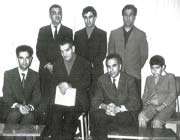Shahriyar, an emotional poet
Seyed Mohammad Hussein Behjat Tabrizi better known by his pen name Shahriyar was born in Tabriz, northwestern Iran in 1905. His father, Haj Mir Agha Khashknabi was a famous attorney is Tabriz and a respected man with a taste for literature. Shahriyar's mother as put by the poet in his famous piece entitled' Oh, My Mother' was also familiar with the world of poetry. Shahryar's childhood was more or less intertwined with revolutionary moves and conflicts in his hometown Tabriz and thus along with his family, Shayriyar moved to the Khashknab village. Shahriyar started his preliminary studies by reading the famous collection of poetry of classical Iranian poet, Saadi called Golestan and a number of other old books. At the same time he became acquainted with another great Iranian Poet, Hafez. Shayriyar was so fond of Hafez that once he said: "I owe whatever I have to Hafez." Later Shahriyar went to Tehran and continued his studies in the capital at the Darolfonoun School and then began his studies in the field of medicine.

However, before graduation, he gave up medicine and in 1931started a career as a state employee in Khorasan and later in Tehran. Although, while in Tehran, a group of friends used to visit Shahriyar, he spent most of his time in solitude and believed that loneliness and isolation are prerequisites of poetry. In 1953, Shahriyar's father passed away and 13 years later his mother breathed her last, too prompting him to leave Tehran for Tabriz forever.
The first piece by Shahriyar was entitled ' Soul of the Butterfly'. Defining poetry, Shahriyar says: "The essence of a poem is its mild and at the same time touching influence which quite unconsciously leaves its imprint on the human mind. A poem should be something the poet's mind acquires from the nature and life and presents to other minds in the form of a poem.
" Shahriyar was not only good at lyrics; he was also a master of odes. Shahriyar made use of almost all styles and proved unique in all of them. His poems are filled with the most delicate sentiments and he is frank in all he says. As regards his diction, Shahriyar was deeply under the influence of classical Persian poets, such as Eraqi and Saadi. Shahriyar considered mankind's suffering as the core of his poems and believed that a true poem is one, which is inspired by both love and mysticism. Shahriyar is an emotional poet. His sincere emotions are well reflected through all the pieces he composed, particularly in his lyrics.
Greetings, Heydar Baba!
by Mohammad Hussein Shahriyar (1905-1988)
Heydar Baba, when the thunder resounds across the skies,
When floods roar down the mountainsides,
And the girls line up to watch it rushing by,
Send my greetings to the tribesmen and the village folk
And remember me and my name once more.
Heydar Baba, when pheasants take flight,
And the rabbits scurry from flowering bush,
When your garden burst into full bloom,
May those who remember us live long?
And may our saddened hearts be gladdened.
When the March wind strikes down the bowers,
Primrose and snowdrops appear from the frozen earth,
When the clouds wing their white shirts,
Let us be remembered once again
Let our sorrows rise up like a mountain.
Heydar Baba, let your back bear the mark of the sun.
Let your streams weep and your face beam with smiles.
Let your children put together a bouquet
And send it to us when the wind blows this way
So that, perhaps, our sleepy fortune be awakened.
Heydar Baba, may your brows be bright.
May you be circled by streams and gardens?
And after us, may you live long.
This world is full of misfortunes and losses.
The world is replete with those bereaved of sons and orphaned.
Heydar Baba, my steps never crossed your pass.
My life was spent, becoming too late to visit you
I know not what became of all those beautiful girls.
I never knew about deadends, about paths of "no return".
I never knew about separation, loss and death.